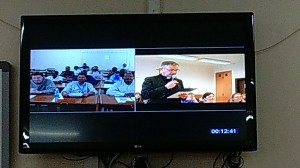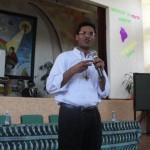 Religious Antecedents of Secularisation, and Secularist Consequents
Religious Antecedents of Secularisation, and Secularist Consequents
on Religion: Insights from Social Sciences
Sahaya G. Selvam, sdb
Abstract
Religion and secularism have a reciprocal relationship. The roots of political secularism and social secularisation could be traced within religion, and the rise of a secularist culture elicits a reactionary feedback from religion in the form of religious spirituality at best, and fundamentalism and fanaticism at worst. Basing itself on the historical context of the watershed events in European history that marked the rise of secularisation and secularism, the present paper points out the antecedents of secularism situated within religion. The paper argues that religion can be described in its four dimensions: creed (a set of beliefs explaining the mystery dimensions of life), code (a set of ethical principles and prescriptive and proscriptive […]
Talks & Presentations
Academic Presentations
Youth Development in Africa: Challenges and Opportunities
 Youth Development in Africa: Challenges and Opportunities
Youth Development in Africa: Challenges and Opportunities
My presentation on 9 March 2015, at a joint teleconference between Institute of Youth Studies at Tangaza University College, Kenya and the Institute of Family Studies at the Catholic University of Lublin, Poland.
The purpose of the paper was to provoke some discussion among the students of both the institutions.
Preliminary Remarks
0.1. It could come as a surprise to some of my listeners that the speaker this afternoon is not an African. This is the advantage that scientific method offers us. A person from anywhere could scientifically look at a global or local phenomenon anywhere using the methodology of science. This said, having lived in two countries in the African continent for the past 23 years, and having travelled across the continent visiting at least 10 other countries, I dare […]
Positive Psychology as a theoretical framework for psychology of religion
Psychology of religion is now a well acknowledged branch of psychology that uses the theoretical framework and methodology of mainstream psychology to examine religious sentiment and behaviour – collective and individual. The paper begins by reflecting on the dilemma that the psychological study of religion faces: between a measurement paradigm and seeking an overarching theoretical framework. The second part of the paper focuses on one contemporary movement within mainstream psychology, namely, positive psychology that engages with existential questions like wellbeing and happiness, with an empirical grounding. Moreover, research and intervention within positive psychology are led by a catalogue of core virtues and character strengths that have strong religious underpinnings. The paper discusses the viable use of the theoretical and methodological framework of positive psychology in the study of religion, and considers the added value that positive psychology brings to teaching and learning about religion in secular contexts.
DOWNLOAD SUMMARY<<Positive Psychology and […]
Youth Caught in the Web
 Nairobi, 15 April 2011
Nairobi, 15 April 2011
A three-day symposium organised by the Institute of Youth Ministry (IYM), came to an end today at Tangaza College. On three afternoons different experts shared their ideas to a large audience on the theme of www.youthcaughtintheweb.com The symposium is an annual event, and this year’s one was specially planned by Fr Hubert Pinto. On the first day, Mr Ronald Omboto, an IT-expert, led a three hour session on the history of Internet and the World wide web (WWW). He spoke also of the tremendous possibilities that exist due to this relatively new development. He also enumerated the socio economic political and cultural impact of the internet.
On the 2nd day, Fr Sahaya G. Selvam, SDB led the discussion on three sub-themes related to ‘youth caught in the web’. He began […]